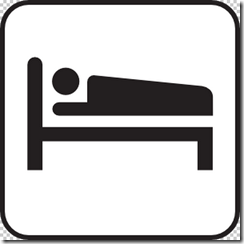It’s become popular amongst some of my friends to scoff at my five hours of sleep and worry about my future health. In response to these concerns, I offer the following:
Science has proven that a small segment of the population are genetically predisposed to needing to sleep less. This predisposition seems to run in families. Since I have rarely slept more than 5-6 hours for my entire life, and since my brother and sister are also extremely short sleepers, I may be one of these genetic mutants.
Alexandra Damsker may be as well.
So I may have an unfair advantage over most people.
Even if it’s not genetic, I ask these naysayers and detractors a simple question:
Do I ever seem tired? Lethargic? Do you think that the quality of my work is suffering due to my lack of sleep? Am I not accomplishing enough because of my need for rest? Am I short tempered? Prone to depression? Abusing drugs or alcohol?
If you were to pick ten people from your life who appear chronically tired or fatigued, would I make the list?
Would my name have even popped up in your mind?
I don’t think so. It’s convenient to think that sleeping as little as I do is somehow hurting my productivity or turning my days into fatigue-riddled disasters, but it’s simply not the case.
Here’s the real problem with all of this advice that Damsker and I offer:
Following it will require people to watch less television, cease snacking in the evening, exercise more often, learn to meditate, and make changes in their careers that will require great effort, long term planning, patience, and enormous sacrifices.
I do not know many people who would be willing to make these changes in their lives.
I sleep as much as my body wants me to sleep. But I also believe that most people could be sleeping less. By avoiding wasted time in bed and by making a concerted effort to awaken one hour earlier than usual, I think most people could shave at least an hour of their sleep each night.
Last year a friend asked me how to be more productive. She had just had her second child and felt like she was never getting anything done. I told her to wake up an hour earlier than normal each morning and use that hour as productively as possible. "Give it a week," I advised. "See what happens."
A few weeks later, my friend posted a public thank you on Facebook, telling her network that she had taken my advice and had accomplished so much in the hours she had recaptured and felt no negative impacts to her loss of sleep.
That was more than a year ago. She has continued to sustain the change and remains happy about it.
You could probably do the same if you're sleeping eight or more hours every night.
Give it a week. See what happens.


